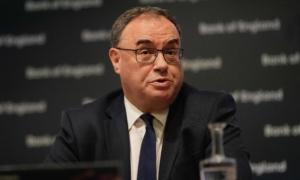
Share To Alt-Tech
This article was originally published on Epoch Times - World. You can read the original article HERE
The Bank of England Governor Andrew Bailey said the underlying trend was that of ‘continued progress in disinflation.’
The decision by the bank’s Monetary Policy Committee (MPC) came on Thursday amid wide expectations of a cut and reflecting the “continued progress in disinflation.”
There was strong consensus among the MPC members, with eight votes in support of the cut and only one vote to hold the rate at 5 percent.
The decision comes after official inflation data recorded a rise to 1.7 percent in September, below the BoE’s 2 percent target.
The BoE is cautious about slashing interest rates “too fast or by too much.”
It has long stressed that it will keep the monetary policy restrictive for as long as it takes to achieve a sustainable inflation rate.
UK inflation has been on an upward trajectory for over two years, reaching a peak of 11.1 percent in October 2022. The bank noted the progress in inflation reduction and the slowdown in food price inflation and energy prices.
It said that keeping interest rates high helped slow down price rises.
“If inflation remains low and stable it’s likely that we will reduce interest rates further. But we have to be careful not to cut interest rates too quickly or too much. High inflation has affected everyone, but it particularly hurts those who can least afford it,” the BoE said on Thursday.
The bank expects inflation to rise slightly again over the next year, to around 2.75 percent, as household energy prices provide “less of a drag” than in recent months.
The rate is then expected to fall back to the 2 percent target.
However, she added that she is under “no illusion about the scale of the challenge facing households after the Conservatives’ mini-budget.”
“That’s why we are taking the long-term decisions to fix the foundations and deliver change,” Reeves said.
Autumn Budget
Eased interest rates follow the government’s Autumn Budget that delivered a £70 billion package of tax and borrowing measures.The BoE Governor Andrew Bailey said the policies will place upward pressure on prices.
“The combined effects of the measures announced in the autumn Budget 2024 are provisionally expected to boost the level of GDP by around three-quarter percent at their peak in a year’s time, relative to the August projections.
“The budget is provisionally expected to boost CPI inflation by just under half of a percentage point at the peak, reflecting both the indirect effects of the smaller margin of excess supply and direct impacts from the budget measures,” the minutes read.
The CEBR has estimated the base rate to loosen further next year, falling down to 3.75 percent by the end of 2025.
Global Developments
Along with the impact from domestic policies, the BoE incorporated global growth data and geopolitical tensions in its report.The bank noted the downside risks coming from a softer domestic demand in China and uncertainty around fiscal policies in advanced economies.
It also said that more global shocks that keep inflation high can’t be ruled out.
“For example, developments in the Middle East could increase inflation by causing oil prices to rise,” the BoE said.
Higher prices on commodities and disruption to trade flows in turn drive weaker economic growth and greater external pressures on the rate of inflation.
“To boost the economy and protect our quality of life, the bank should keep interest rates down,” the think tank said.
This article was originally published by Epoch Times - World. We only curate news from sources that align with the core values of our intended conservative audience. If you like the news you read here we encourage you to utilize the original sources for even more great news and opinions you can trust!












Comments